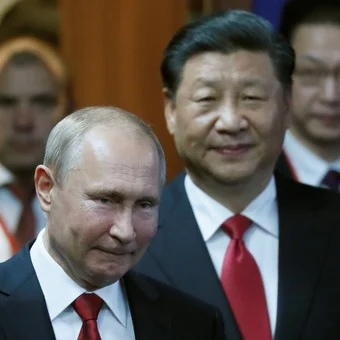By Joaquín Mirkin
The Russian invasion of Ukraine, Vladimir Putin’s real leap into the abyss, has put the place of security of the States at the center of the stage. Why is it not possible to stop the war? Are the world leaders up to the task?
The tragic continuation of the Ukrainian war could mean a global change in the competitive coexistence dominated by the United States and People’s Republic of China (as reported by the United States Office of the Director of National Intelligence in their Global Trends 2040 report). This could mean another scenario where the world is divided into silos and blocs: The United States, The European Union, and Russia and China, each one with corresponding zones of influence.
What will this mean for the countries of Latin America? For global supply chains? Will globalization continue its march or will we see its gradual disbandment?
Unlike what happened throughout the Cold War, where Washington carried out a strategy of “Containment” of the Soviet Union (with little or no trade between blocs), today the economies are interdependent, the most historical integration of capitalism due to digitization and Revolution 4.0, accelerated by the pandemic.
Crisis of Trust
In addition to Cybersecurity and organized smear campaigns on social media (mostly undetected), the leaders are face with important challenges: increasing distrust in institutions, increasing price of energy, possibility of supply interruptions, climate threats, political polarization, endemic racism, organized crime, money laundering, tax evasion, regulatory advances, lack of regulation, protests, social violence, and increasingly demanding and organized consumers. There is no country where political leaders or companies are safe.
As for the private sector, the proliferation of geopolitical and domestic “issues” are leading international companies to expand their areas of Public Affairs and Corporate Intelligence. However, the work and the discussions used to senter on “the project, or on the entrance or exit from the market or the timely investment”, explains the consulting firm McKinsey in a report on Risk Management.
What are the leaders communicating? Do they analyze the geopolitical context in depth, plan their strategies, are their actions and messages formed responsibly before acting? Do these messages take into account the concern of the public opinion? The leaders should leave their pride aside, and ask for help from professionals.
In addition to the goal of profitability, companies must have a clear purpose: the strategic focus is not only on results but also on helping to resolve conflicts that society as a whole is going through. CEOs are increasingly required to help solve social problems, without overexposing themselves to the politics of the situation.
Time for Bravery
The context is extremely difficult for leadership. The demands are huge. For this reason it is essential to analyze the domestic and international terrain, understand the changing contexts, and measure our own strengths and weaknesses to draw new lines of action. Peace and stability require negotiation. The alternative is war —crushing the other— today unfeasible, tragic, immoral, and extremely costly.
A new leadership is needed, with a focus on ethics and results. Postures and complaints are useless and counterproductive. Leading implies effectiveness, dissuasive action, results, supporting the complaints and anxiety of the “passengers”, navigating the turbulence and taking them to their destination.
Ukraine symbolizes a deep challenge to traditional leadership (the pandemic had already been). The crisis reveals, once again, the difference between power and leadership, where we continue to observe leaders without power and powers without leadership. Without a pilot, the ship drifts. Although late, the transfer of power in Germany to Olaf Scholtz, its new Chancellor, is indicative.
“If you know the enemy and know yourself, you need not fear the result of a hundred battles.” Sun-Tzu’s phrase, from the 5th century BC in the Art of War, is more relevant than ever. Analyzing the terrain, understanding geopolitics, changing contexts, and measuring their own strengths and weaknesses is essential for leaders, who must draw new lines of action combining rationality and great audacity. It is time for brave pilots.
This article was originally published at Clarín Newspaper (from Argentina) on May 14, 2022. More information here.


